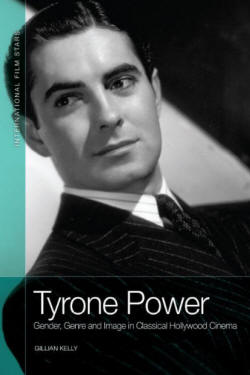

Queer Places:
Hollywood Forever Cemetery, 6000 Santa Monica Blvd, Los Angeles, CA 90038
 Tyrone Edmund Power III[2][3] (May 5, 1914 – November 15, 1958) was an American actor. From the 1930s to the 1950s, Power appeared in dozens of films, often in swashbuckler roles or romantic leads. His better-known films include The Mark of Zorro, Marie Antoinette, Blood and Sand, The Black Swan, Prince of Foxes, Witness for the Prosecution, The Black Rose, and Captain from Castile. Power's own favorite film among those that he starred in was Nightmare Alley.[4]
Though largely a matinee idol in the 1930s and early 1940s and known for his striking looks, Power starred in films in a number of genres, from drama to light comedy. In the 1950s he began placing limits on the number of films he would make in order to devote more time to theater productions. He received his biggest accolades as a stage actor in John Brown's Body and Mister Roberts.
Tyrone Edmund Power III[2][3] (May 5, 1914 – November 15, 1958) was an American actor. From the 1930s to the 1950s, Power appeared in dozens of films, often in swashbuckler roles or romantic leads. His better-known films include The Mark of Zorro, Marie Antoinette, Blood and Sand, The Black Swan, Prince of Foxes, Witness for the Prosecution, The Black Rose, and Captain from Castile. Power's own favorite film among those that he starred in was Nightmare Alley.[4]
Though largely a matinee idol in the 1930s and early 1940s and known for his striking looks, Power starred in films in a number of genres, from drama to light comedy. In the 1950s he began placing limits on the number of films he would make in order to devote more time to theater productions. He received his biggest accolades as a stage actor in John Brown's Body and Mister Roberts.
One of his boyhood friends was Wil Wright, Jr, owner of the Wil Wright's Ice Cream Shoppes chain.
Many survivors of the 1950s speak of the long relationship between Cesar Romero and fellow Fox actor Tyrone Power. Romero, however, insisted that Power "loved the ladies... he couldn't help it, every place he went, boy, those women were there." True enough, Power's affairs with women are well documented, but the star was also, as documented by his biographer Hector Arce, involved with a number of men. Mr Blackwell, then a young actor known as Dick Ellis and, in his own words, a popular "boy toy," was another of Power's romances. They met for "romantic moments in his dressing room and took long rides, speeding down Sunset to Malibu." Power is a classic example of that "second era" of gay star who played the game, and played it quite well. He was talked about among the crowd at the gay parties given by George Cukor or Cole Porter or Christopher Isherwood, but he was known only tangentially. "Tyrone would never have come to a gathering where there were mostly gays," said Robert Wheaton, close with both Cukor and Porter. A George Cukor's associate, Charles Williamson, recalled a friend of his who was procured by Cesar Romero as a trick for Power, who, unlike other stars, preferred middle-class boys over street kids. "He felt it was safer, that they were less likely to cause a scandal," said Williamson. "They understood the need for discretion."
The actress Maureen O’Hara published a memoir in which she recalled that during their filming of The Long Gray Line, she’d walked in on John Ford with an unexpected love interest: “Ford had his arms around another man and was kissing him. I was shocked and speechless…” She put together a case for Ford being a “closet homosexual,” citing his alcoholism, effeminacy and, indeed, his movies. The other man in the embrace she’d seen, as film historians would work out, was O’Hara’s male co-star in the film, Tyrone Power.
In September 1958, Power and his wife Deborah went to Madrid and Valdespartera, Spain, to film the epic Solomon and Sheba, to be directed by King Vidor, co-starring Gina Lollobrigida. Power had filmed about 75 percent of his scenes when he was stricken by a massive heart attack while filming a dueling scene with his frequent co-star and friend, George Sanders. A doctor, Juan Olaguíbel, diagnosed Power's death as "fulminant angina pectoris."[33] He died while being transported to the hospital in Madrid on November 15, aged 44.[5][6] Power was interred at Hollywood Forever Cemetery (then known as Hollywood Cemetery) in a military service at noon on November 21.[34] Flying over the service was Henry King. Almost 20 years before, Tyrone had flown in King's plane to the set of Jesse James in Missouri. It was then that Power had his first experience of flying, which became a big part of his life, both in the U.S. Marines and as a civilian. In the foreword to Dennis Belafonte's The Films of Tyrone Power, King said, "Knowing his love for flying and feeling that I had started it, I flew over his funeral procession and memorial park during his burial, and felt that he was with me." Power was laid to rest beside a small lake. His grave is marked by a unique gravestone, in the form of a marble bench. On the gravestone are the masks of comedy and tragedy, with the inscription, "Good night, sweet prince." At his grave, Laurence Olivier read the poem "High Flight."[35] Power's will, filed on December 8, 1958, contained a then-unusual provision. It stated his wish that, upon his death, his eyes be donated to the Estelle Doheny Eye Foundation, for such purposes as the trustees of the foundation should deem advisable, including transplantation of the cornea to the eyes of a living person or for retinal study. Deborah Power gave birth to their son on January 22, 1959, some two months after Power's death. She would remarry within the year, to the producer Arthur Loew Jr.
My published books: